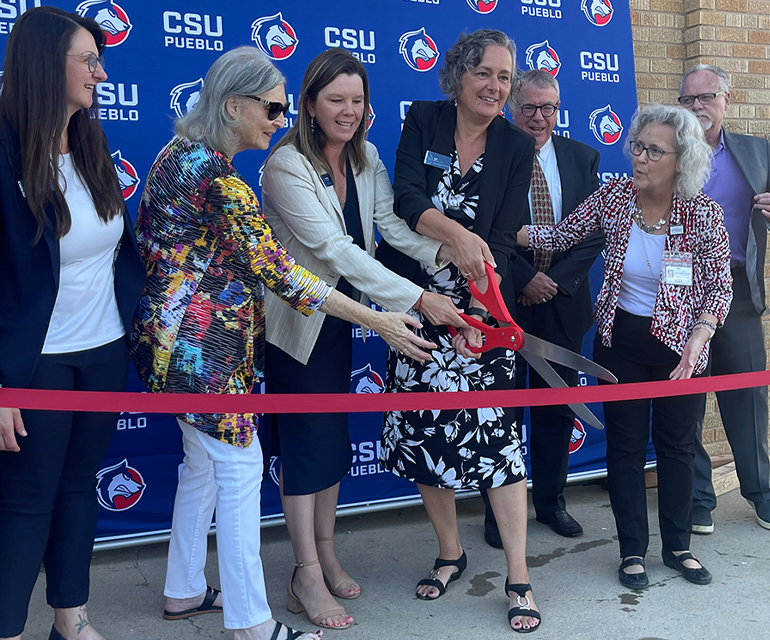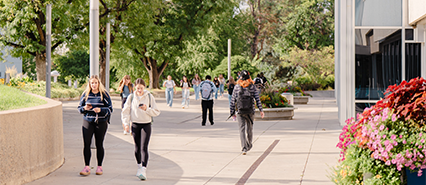New Option for Nursing Students Opens in Walsenburg
Release Date: August 20, 2024

In the shadow of the Spanish Peaks, a ribbon-cutting ceremony marked more than just the opening of a new educational facility. It signaled a potential lifeline for a region grappling with a healthcare crisis that has long plagued rural America. Colorado State University Pueblo (CSU Pueblo) Extended Studies' new nursing program in Walsenburg, set to begin classes this fall, was giving hope in what many describe as a medical desert.
The August morning sun cast long trails across the renovated elementary school building, now adorned with CSU Pueblo's logo and, inside, an abundance of potted plants—a far cry from what one attendee jokingly referred to as "Barney's Playhouse." Just two blocks from Main Street and a stone's throw from the volunteer fire department, the transformed space represents more than just an educational outpost; it's a symbol of rural resilience and forward-thinking collaboration.
From Elementary School to Nursing School; a community transformation.
How a Chance Meeting Sparked a Healthcare Revolution
The genesis of this project reads like a serendipitous encounter straight out of a political drama. Three years ago, at a legislative luncheon hosted by the Pueblo Chamber of Commerce, Carlton Croft, director of Huerfano County Economic Development, found himself seated with the Dean of Extended Studies and the Provost of CSU Pueblo. In a moment that would prove pivotal, Croft laid bare the region's predicament: "We desperately need higher education in Huerfano County." Those words, uttered over a meal, set in motion a chain of events that culminated in today's ceremony.
The Four-Legged Stool: an approach to rural development
Workforce, Connectivity Jobs and Housing are the key to economic growth
Lola Spradley, Chair of the Huerfano County Economic Development and treasurer at the Spanish Peaks Regional Medical Center, reflected on that fateful meeting. "When you have like minds and one of them has a need and sees an opportunity, and you can marry those with follow-up actions, plans, and commitment, then—Bingo!" she exclaimed, wagging her finger with the satisfaction of a long-held dream realized.
Where you live should not dictate how you live
The nursing program is just one part of what Spradley calls their "four-legged stool" approach to regional development. Alongside workforce development, they're focusing on connectivity, job creation, and housing to broaden the economic base of the county and surrounding areas. "To grow jobs, we have to have workforce development," Spradley explained. "We have people at the hospital driving from Colorado Springs to work here because they can't find suitable housing. We're always bringing in travel nurses because we don't have enough."
Kay Whitley, CEO of Spanish Peaks Regional Medical Center, echoes this sentiment. "Where you live should not dictate how you live," she says, underscoring her commitment to strengthening local medical offerings. Whitley's vision extends beyond the current services, aiming to establish a medical residency program and OB/GYN care. This expansion is crucial for the area's ranchers, who often forgo medical attention when faced with long travel distances.
Whitley's enthusiasm has inspired staff participation, including her son Matt Whitley, Spanish Peaks Ambulance director, and colleague Darcy Saint James, demonstrating a community-wide investment in improved healthcare access.
This local initiative dovetails with broader state efforts. In the 2022 legislative session, Governor Jared Polis signed into law SB22-172, the Colorado Rural Health-care Workforce Initiative. The act aims to expand the number of healthcare professionals practicing in Colorado's rural or frontier counties, authorizing institutions of higher education to establish healthcare professional education programs in these underserved areas.
The timing couldn't be more critical. Colorado faces a staggering deficit of 526 registered nurses per year, a shortfall exacerbated by an aging workforce and early retirements. Adding to the alarm is the projected 32.2% growth rate in job openings for nurse educators by 2031, far outpacing the average job growth of 17%. With 35% of nurse educators over the age of 55 and eyeing retirement, the shortage threatens to become a self-perpetuating crisis.
CSU Pueblo's program, bolstered by a $1.3 million Opportunity Now grant, aims to address this shortage not just by training new nurses, but by cultivating the next generation of nursing instructors. "The lack of nursing instructors has led to some of our partner colleges and universities having to turn potential nursing students away," explained Alexandra Hansen, CSU Pueblo's regional development officer for operations and advancement in an interview with the Colorado Sun. The grant's impact is amplified by CSU Pueblo's recent recognition in a Harvard University study, which highlighted the school's success in promoting economic mobility among low-income students.
For the inaugural cohort of eight students, many of whom are nontraditional learners juggling work and family responsibilities, the program offers a lifeline to career advancement and stability. Matt Whitley and Darcy Saint Peter are typical of the students the program aims to serve.
Saint Peter, a local resident and EMT Shift Supervisor, saw the program as her best chance to balance work and education. "I can't work and go to school anywhere else," she said. "This seemed more tailored to people who work in the hospital." At an age where the physical demands of ambulance work are taking their toll, Saint Peter views nursing as a way to continue serving her community well into her later years.
Whitley echoed these sentiments, emphasizing the physical toll of ambulance work and his desire to support his local community. "There's a lot of heavy lifting," he noted, underscoring the need for career paths that allow healthcare workers to transition as they age.
The program's structure—offering prerequisite courses online before transitioning to face-to-face instruction in the spring—caters to the needs of working adults. Mariah Buss, Nursing and Health Sciences Recruitment Coordinator at CSU Pueblo, said the importance of supporting nontraditional students. "Most students who drop out of nursing programs drop out because of finances," Buss explained. A grant from the Colorado Health Foundation will help address these barriers, covering costs like childcare that often derail adult learners.
CSU Pueblo's program's local focus aims to stem the brain drain that plagues many rural areas. "We basically bring higher-ed to them," Buss said, highlighting how this approach allows students to advance their careers without uprooting their families.
The impact of this program extends beyond individual career prospects. Rural nurses often face a broader range of healthcare challenges than their urban counterparts, dealing with limited resources and longer transport times of their patients. Saint Peter recalled the high-stakes decisions rural healthcare workers must make, such as whether to airlift a heart attack patient or attempt a long drive to a trauma center—choices rarely faced in urban settings.
For veterans in the region, many of whom struggle with the long drive to the Veterans Hospital in Colorado Springs, the new nursing school offers hope for more accessible care. Dentry DeWolf, the Veterans Service Officer for the county and a 22-year Air Force veteran, sees the program as "positive all around," potentially easing the burden on disabled veterans and offering educational opportunities to younger veterans moving into the area.
As the day's festivities winded down, the mood was one of cautious optimism. Many in attendance know first-hand the harsh realities of rural healthcare. They are now hoping for CSU Pueblo's nursing program to offer more than an educational opportunity. It's a chance to "grow their own" healthcare workforce, and a bold step towards ensuring rural communities stay strong.
In the words of Talea Logan, a nurse at Spanish Peaks Regional Medical Center who found renewed passion for her profession after burning out during the COVID-19 pandemic: "This program isn't just about training nurses. It's about revitalizing our community, one caregiver at a time."


